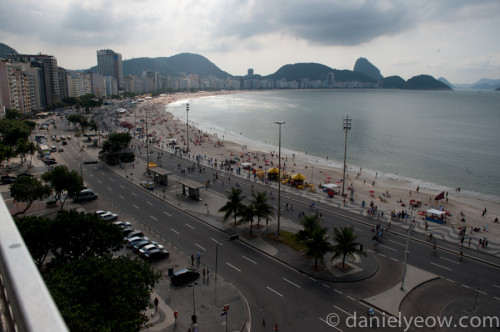River of January
This is not the first time I’ve been to Rio. Five years ago, while undertaking an epic voyage around South America, I came across this beautiful city (read about it here). Of course, traveling with no purpose other than to travel and see things is very different from traveling with a purpose, and this is a very different kind of trip.
The United Nations Conference on Sustainable Development in Rio de Janiero, also known as Rio+20 (named after the earth summit which took place in Rio 20 years ago) is a coming together of various different actors, including governments, non-government organizations, and groups representing the private sector, in a conference on… sustainable development (as the title suggests).
What is sustainable development? “sustainable development is development that meets the needs of the present without compromising the ability of future generations to meet their own needs” is the most oft-quoted definition, and it’s a pretty good one. I can only imagine how many hours of debate and haggling over individual words took place to arrive at that definition. What is probably even more frustrating for those who were involved in that process is that sustainable development is a term which is still thrown around carelessly and used to represent everything from broad environmentalism, all the way to eco-terrorism at the other end of the spectrum.
At the heart of the matter is survival. Think about the word itself for a moment – sustainable development. It’s about surviving, but it’s about more that just surviving – it’s about developing, that is, growing in some sense. Historically, the term sustainable development has been strongly associated with economic development and poverty alleviation. How do we grow the economies of the most impoverished nations in such a way that they become self-sustaining? More recently, sustainability has become strongly associated with environmentalism. With climate change threatening the fragile earth systems which we depend on for sustenance, combating climate change in some way has become an essential ingredient to the formula for sustainable development.
So what’s the deal with Rio? Same basic deal as with all the climate conferences – countries are trying to reach a “deal” to save the earth’s environment. So here’s the thing, while the media has been caught up with trying to present both sides of a debate on climate science that doesn’t really exist in the serious scientific community, countries have been trying to move forward on a climate deal, having already accepted the conclusions of reports like the IPCC’s 4th assessment – Climate change is real, it’s bad, and it’s mostly our fault.
Why is this so damn hard? Have you ever been in a large group of people at the movies trying to decide what to see? It’s a bit like that. There are many issues being discussed, but the big one is CO2 emissions. Before the industrial revolution its concentration in the atmosphere was 280 parts per million, now it’s about 390. More CO2 leads to an enhanced greenhouse effect – more heat gets trapped in the earth’s atmosphere. This is bad (I cover the reasons in more detail here).
See, the problem is that most of these emissions were put in the earth’s atmosphere by developed countries in the years since the advent of the industrial revolution. Britain, Germany, France, Russia, and the United States basically. On a per-capita basis, you would also include most of western europe, and Australia. This is how those places became developed. Their huge economic, and military advantages today exist because of all that carbon they put into the air.
Now we’ve developed enough to have scientists who are smart enough to tell us that there is a big problem with pumping all this CO2 into the atmosphere, but we’re not smart enough to come up with a solution. What’s the problem? The rest of the world wants to develop, of course. The easiest way to do that is to do it in the same way as the current developed world did it, but we all know that would be inviting ecological disaster. So now, developed countries are telling developing countries that they should develop without emitting so much CO2. Developing countries aren’t stupid though, they know that developing in that way is much more costly to their economy, so they’re asking for compensation. Developed countries, still flailing economically from the global financial crisis, are obviously still tight with their purse strings.
See the problem?
If anyone has any bright ideas, I’d love to hear about it.
So what am I doing in Rio? I’m here with Worldwatch Institute as a bit of a media man. I’m here to document what goes on, do some interviews, and take some photos. I’ve also managed to land a role as moderator of a panel debate at our official side event (if you’re in Rio, you really should pop by).
So far our time has been spent organizing logistics and getting over jet lag. We went to a film premier of a documentary made by the European Environment Agency. On the way back we walked along the beach, occasionally dipping our feet in the water. The beach here is the first decent beach I’ve been to since I was last in Australia (in January 2011) and it made me a little homesick.
By the end of our time here (we leave next Sunday) I hope to have enough material to construct a short series of mini-documentaries, each no longer than two minutes, highlighting some aspect of the experience of Rio+20. Again, any ideas on how to do this well would be greatly appreciated.



i don’t know much about economics, technology, or climate science.
some lobby groups (http://endfossilfuelsubsidies.org/) tell us to lobby the government to stop giving ‘subsidies’ to industries such as the coal industry, and mining industry, and instead use that money to invest in new technology to become more energy efficient with less emissions (which to me sounds better than a ‘carbon tax’).
(+/- also take the money out of the aussie govt’s national broadband network scheme (35.9bil over 10 years), which is a major investment into technology that potentially may become obsolete?)
transferring ‘subsidies’ from fossil fuels to clean energy sounds like a nice idea.
but do you know if it is a practical solution?
Just a thought. There is several of these kind of plans. http://media.beyondzeroemissions.org/ZCA2020_Stationary_Energy_Report_v1.pdf
The question is more of courage than anything else. In Australia in particular, politicians are experiencing persisting known condition as lack of gut and conviction. It just takes a right mindset to set things in motion. Remember that it took Pearl Harbour before and the USA entered the war. It took less than a few months to convert everything producing factories in the country towards war effort. I think the same analogy can be made here.
Hi Daniel, I’ve been reading your blog posts. I enjoyed your Rio series. Keep up the citizen journalism.
Also, CO2 with a 2 superscript isn’t chemically correct. Superscripts in chemistry are for ionic charges (e.g. Ca2+). The 2 in CO2 is subscript because that’s how many of that atom (or ion) is in that chemical.
I often wonder why people use CO2 (superscript) when there is a perfectly correct and well understood nomenclature for it.